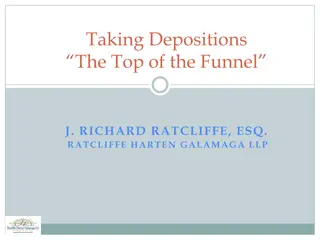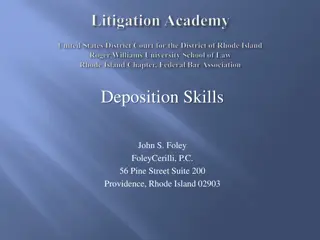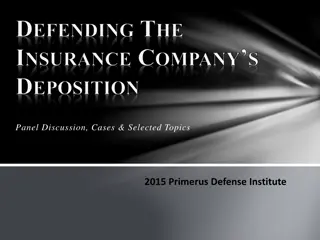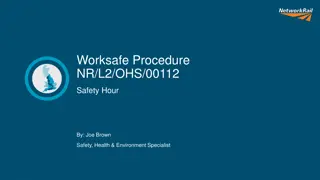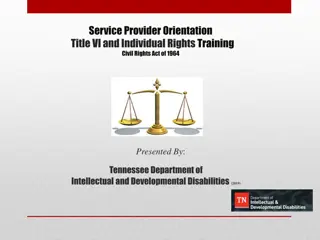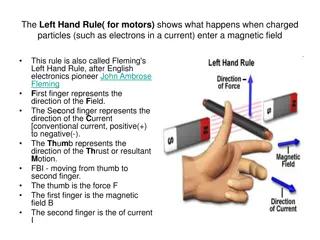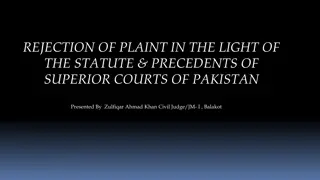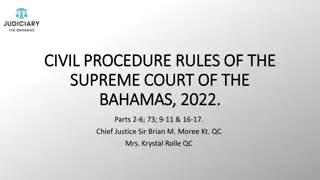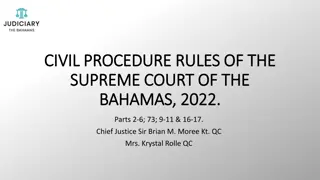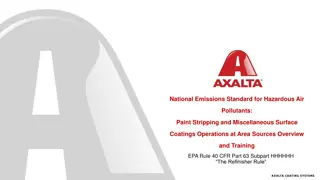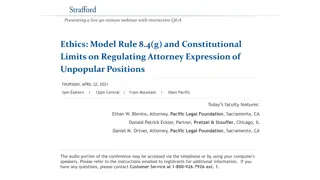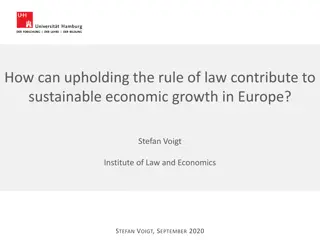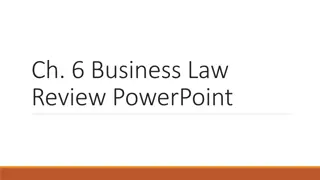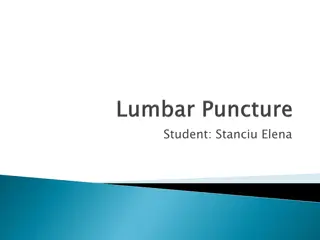Understanding Rule 30(b)(6) Depositions in Civil Procedure
Rule 30(b)(6) allows parties to depose organizations by naming them as the deponent. This method streamlines the process, reduces costs, and ensures testimony from designated officers or agents. The rule applies to various entities such as corporations, partnerships, and governmental agencies, providing clarity in examination matters.
Download Presentation

Please find below an Image/Link to download the presentation.
The content on the website is provided AS IS for your information and personal use only. It may not be sold, licensed, or shared on other websites without obtaining consent from the author. Download presentation by click this link. If you encounter any issues during the download, it is possible that the publisher has removed the file from their server.
E N D
Presentation Transcript
Rule 30(b)(6) Depositions Breakfast Talk With Ellen Flynn and Joyce E. Smithey January 19, 2018, at the Maryland Association for Justice
Federal Rule of Civil Procedure 30(b)(6) RULE 30(b)(6) (b) Notice of the Deposition; Other Formal Requirements. (6) Notice or Subpoena Directed to an Organization. In its notice or subpoena, a party may name as the deponent a public or private corporation, a partnership, an association, a governmental agency, or other entity and must describe with reasonable particularity the matters for examination. The named organization must then designate one or more officers, directors, or managing agents, or designate other persons who consent to testify on its behalf; and it may set out the matters on which each person designated will testify. A subpoena must advise a nonparty organization of its duty to make this designation. The persons designated must testify about information known or reasonably available to the organization. This paragraph (6) does not preclude a deposition by any other procedure allowed by these rules.
Maryland Rule of Civil Procedure 2-412(d) Md. Rule 2-412(d) largely mirrors 30(b)(6) A party may in a notice and subpoena name as the deponent a public or private corporation or a partnership or association or governmental agency and describe with reasonable particularity the matters on which examination is requested. The organization so named shall designate one or more officers, directors, managing agents or other persons who will testify on its behalf regarding the matters described and may set forth the matters on which each person designated will testify. A subpoena shall advise a nonparty organization of its duty to make such a designation. The persons so designated shall testify as to matters known or reasonably available to the organization.
What is a Rule 30(b)(6) deposition? Allows a party to take the deposition of an organization by naming the entity as the deponent in the notice of deposition or subpoena
Why take a Rule 30(b)(6) deposition? Know in advance of deposition that an employee is a managing agent Do not need to search for employees with knowledge of facts keeps costs down (if you are getting good information) Protects entities by eliminating unnecessary depositions
The Rule applies to: Partnerships Joint ventures Pension trust fund Domestic and foreign corporations Foreign governmental entities
How many Rule 30(b) depositions may be taken? If entity designates multiple individuals, counts as a single deposition Does 30(a)(2)(A) apply- do you need leave to take second deposition? May take deposition of the same witness in individual capacity and in an organizational capacity Must designate a witness to speak on behalf of the entity even if prior fact witness gave testimony
What are the time limits for a Rule 30(b)(6) deposition? Rule 30(d)(1)- one day of seven hours Advisory Committee Notes to 2000 Amendments of Federal Rules ( For purposes of this durational time limit, each person designated under Rule 30(b)(6) should be considered a separate deposition. ) If witness is deposed as an individual and as a corporate designee, each is subject to independent 7-hour limit
Place Corporation s principal place of business- presumption (and strategically effective when deficiencies in document production are identified in deposition) Other location- consider cost, convenience and litigation efficiency Rule 30(b)(4)- telephonic depositions by stipulation or order Cost shifting
Notice requirements Date, time, and place, designate any materials to be produced, and manner of recording Consider videotaping and document requests Describe with reasonable particularity the subject matter
Strategy tips for drafting deposition notice Reasonable particularity Do not use including but not limited to language Notice should be a deposition exhibit so use plain English No limits but be reasonable or risk delay with motions practice and having the court tailor the notice Serve document request in advance of deposition instead of produced at deposition Consider responses to preceding discovery requests including interrogatories and admissions
Specificity Required painstaking specificity Examples held to be overbroad: all conversations between plaintiff and any employee explanations for why documents were not previously produced Examination would include but not be limited to areas set forth
Is a subpoena necessary? Only if corporation is a non-party Must identify with reasonable particularity the subjects in both notice and subpoena Subpoena must advise corporation of its duty to designate someone to testify Nationwide territorial limits of Rule 45 apply to Rule 30(b)(6) depositions
Duty to Designate May be one or more designees Burden is on corporation, but, This burden is not essentially different from that of answering interrogatories under Rule 33. Advisory Committee Notes to 1970 Amendments of Rules MUST be able to testify about matters known or reasonably available to corporation First-hand knowledge is not required (designee can review documents and inquire of employees to gather information responsive to topics)
Duty to Designate Corporation must provide name and position in advance Cannot refuse to designate a witness by saying no one is available with knowledge Noticing party is not allowed to decide who will be the witness
Duty to Prepare Corporation has affirmative duty to prepare its deponents to respond fully and completely Readily available information includes documents, past employees, prior witness deposition testimony and exhibits, and other sources If people with knowledge are no longer employed or deceased, still have duty to prepare
Duty to Prepare Fact that documents are voluminous or facts come from different people does not absolve corporation from the duty Duty is not infinite, focus on good faith Always ask what did you do to prepare (who did you ask, where did you look)
Duty to redesignate If clear designated witness is not able to testify, corporation must immediately designate and prepare another Court may order deposition upon written questions or interrogatories Plaintiff must raise duty to redesignate prior to close of discovery
Motions to compel and sanctions Rule 37(b)(2)(A) sanctions apply: (A) For Not Obeying a Discovery Order. If a party or a party's officer, director, or managing agent or a witness designated under Rule 30(b)(6) or 31(a)(4) fails to obey an order to provide or permit discovery, including an order under Rule 26(f), 35, or 37(a), the court where the action is pending may issue further just orders. They may include the following: (i) directing that the matters embraced in the order or other designated facts be taken as established for purposes of the action, as the prevailing party claims; (ii) prohibiting the disobedient party from supporting or opposing designated claims or defenses, or from introducing designated matters in evidence; (iii) striking pleadings in whole or in part; (iv) staying further proceedings until the order is obeyed; (v) dismissing the action or proceeding in whole or in part; (vi) rendering a default judgment against the disobedient party; or
Failure to Produce Can be ordered to produce a witness Rule 37 sanctions proper Monetary sanctions Repeated failures can warrant an entry of summary judgment
Failure to Prepare Sanctions available Court may order costs to prepare motion and time associated with taking deposition Preclude corporation from relying on information not disclosed by 30(b)(6) deponent
Scope of examination Rule cannot be used to limit what is asked May be examined in same manner as any other deponent BUT witness cannot be sanctioned if she does not know the answer to a question outside the notice May not instruct witness not to answer questions
Advantages of a 30(b)(6) deposition Can get admissible admissions Can be used for any purpose consistent with Rules of Evidence Better than interrogatories Efficient and cost effective because burden is on corporation
Disadvantages of 30(b)(6) deposition Few disadvantages Corporations tend to designate least likely to make damaging statements Time and cost
Strategies for taking deposition Valuable areas of inquiry Organizational structure Personnel policies and practices Identification of decision makers Criteria for making decisions Record keeping Statistical information Facts upon which corporation based its denial of allegations in Answer
Strategies for taking deposition Confirm witness understands speaking for corporation Confirm witness reviewed the deposition notice Confirm competence to testify about topics If not competent to testify, who is? Nature and scope of document search Educational and professional background
Strategies for taking deposition If witness cannot testify, make record at the deposition detailing the deficiencies Make demand for another witness and follow up after deposition


